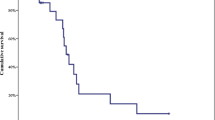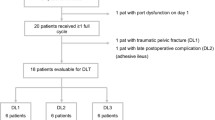Abstract
Purpose
To evaluate the efficacy and safety of irinotecan as second-line treatment in patients with advanced colorectal cancer (ACC) failing or relapsing after 5-fluorouracil (5-FU) plus leucovorin (LV) standard chemotherapy.
Patients and methods
Irinotecan was randomly administered in two different schedules (once every 3 weeks, and every 10 days) in patients failing prior 5-FU plus LV. Patients were randomized to two treatment groups: group A received irinotecan 350 mg/m2 every 21 days and group B received irinotecan 175 mg/m2 days 1 and 10 every 21 days.
Results
Group A comprised 60 patients: 34 male/26 female, median age 64 years (range 48–70 years), and median Karnofsky performance status (PS) 90. Their metastatic sites included liver (n=47), lymph nodes (n=27), lung (n=14), abdomen (n=14), pelvis (n=8), "other" (n=2), and local recurrence (n=12). Group B comprised 60 patients: 36 male/24 female, median age 62 years (46–70 years), and median PS 90. Their metastatic sites included liver (n=49), lymph nodes (n=29), lung (n=17), abdomen (n=16), pelvis (n=11), "other" (n=2), and local recurrence (n=13). Group A showed the following responses: complete response (CR) 2, partial response (PR) 12, stable disease (SD) 21, progressive disease (PD) 26, overall response rate (ORR) 23%, tumor growth control 58%. Group B showed the following responses: CR 1, PR 14, SD 22, PD 23; ORR 25%; tumor growth control 62%. Toxicities included acute cholinergic syndrome (group A 53%, group B 19%; P<0.0001), late-onset diarrhea grade 1/2 (group A 21%, group B 46%) and grade 3/4 (group A 41%, group B 66%; P<0.0001), nausea and vomiting grade 1/2 (group A 34%, group B 59%) and grade 3/4 (group A 30%, group B 12%; P<0.0001), neutropenia grade 3/4 (group A 27%, group B 28%; P<0.03), with febrile neutropenia seen in only four patients in group A, anemia grade more than 2 (group A 28%, group B 12%; P<0.05), asthenia grade more than 3 (group A 24%, group B 18%; P<0.001), and alopecia grade more than 3 (group A 40%, group B 34%; P<0.2).
Conclusions
The present study indicates that, in patients with ACC who have relapsed after 5-FU plus LV, the administration of irinotecan fractionated into two doses every 21 days yields a similar efficacy to, but a much lower incidence of toxicity than, the same total dose of irinotecan administered once every 21 days.



Similar content being viewed by others
References
Giovanella BC, Stehlin JS, Wall ME, et al (1989) DNA topoisomerase I-targeted chemotherapy of human colon cancer in xenografts. Science 246:1046
Bognel C, Rekacewicz C, Mankarios H, et al (1995) Prognostic value of neural invasion in rectal carcinoma: a multivariate analysis on 339 patients with curative resection. Eur J Cancer 31A:894
Gupta EL, Mick R (1994) Metabolic fate of irinotecan in humans: correlation of glucuronidation with diarrhea. Cancer Res 54:3723
O'Reilly S, Rowinsky EK (1996) The clinical status of irinotecan (CPT-11), a novel water soluble camptothecin analogue. Crit Rev Oncol Hematol 24:47–70
Masuda N, Kudoh S, Fukuoka M (1996) Irinotecan (CPT-11): pharmacology and clinical application. Crit Rev Oncol Hematol 24:3–26
Shimada Y, Yashiro M, Wakui A, et al (1993) Phase II study of CPT-11, a new camptothecin derivative, in metastatic colorectal cancer: CPT-11 Gastrointestinal Cancer Study Group. J Clin Oncol 11:909–913
Rothenberg ML, Eckardt JR, Kuhn JG, et al (1996) Phase II trial of irinotecan in patients with progressive or rapidly recurrent colorectal cancer. J Clin Oncol 14:1128–1135
Pitot HC, Weder DB, O'Conell MJ, et al (1997) Phase II study of irinotecan in patients with metastatic colorectal cancer. J Clin Oncol 15:2910–2919
Rougier P, Bugat R, Douillard JY, et al (1997) Phase II study of irinotecan in the treatment of advanced colorectal cancer in chemotherapy naïve patients and patients pretreated with fluorouracil-based chemotherapy. J Clin Oncol 15:251–260
Miller A, Hoogstraten B, Staquet M, Winkler A (1981) Reporting results of treatment. Cancer 47:207–217
Kaplan EL, Meier P (1958) Non parametric estimation for incomplete observations. J Am Stat Assoc 53:457–481
Mantel N (1966) Evaluation of survival data and two new rank order statistics arising in its consideration. Cancer Chemother Rep 50:163–170
Herben VMM, Schellens JHM, Swart M, Gruia G, Vernillet L, Beijnen JH, Huinink WWB (1999) Phase I and pharmacokinetic study of irinotecan administered as a low dose, continuous intravenous infusion over 14 days in patients with malignant solid tumors. J Clin Oncol 17:1897–1905
Mitry E, Ducreux M, Rougier P (1998) Second-line irinotecan chemotherapy in the treatment of metastatic colorectal cancers: phase III trials (in French). Bull Cancer. Dec; Spec No:38–42
Van Cutsem E, Peeters M (1998) Irinotecan monotherapy in the treatment of colorectal cancers: results of phase II trials (in French). Bull Cancer. Dec; Spec No:33–37
Boige V, Raymond E, Armand JP (1998) Irinotecan: various administration schedules, study of drug combinations, phase I experience (in French). Bull Cancer. Dec; Spec No:26–32
Ulrich-Pur H, Kornek GV, Fiebiger W, Gedlicka C, Raderer M, Lenauer A, Depisch D, Lang F, Pidlich J, Scheithauer W (2001) Multicenter phase II trial of dose-fractionated irinotecan in patients with advanced colorectal cancer failing oxaliplatin-based first-line combination chemotherapy. Ann Oncol 12:1269–1272
Cunningham D, Pyrhönen S, James RD, Punt CJA, Hickish TF, Heikkila R, Johannesen TB, Starkhammar H, Topham CA, Awad L, Jacques C, Herait P (1998) Randomised trial of irinotecan plus supportive care versus supportive care alone after fluorouracil failure for patients with metastatic colorectal cancer. Lancet 352:1413–1418
Rougier P, Van Cutsem E, Bajetta E, Niederle N, Possinger K, Labianca R, Navarro M, Morant R, Bleiberg H, Wils J, Awad L, Herait P, Jacques C (1998) Randomised trial of irinotecan versus fluorouracil by continuous infusion after fluorouracil failure in patients with metastatic colorectal cancer. Lancet 352:1407–1412
Author information
Authors and Affiliations
Corresponding author
Rights and permissions
About this article
Cite this article
Tsavaris, N., Ziras, N., Kosmas, C. et al. Two different schedules of irinotecan (CPT-11) in patients with advanced colorectal carcinoma relapsing after a 5-fluorouracil and leucovorin combination. A randomized study. Cancer Chemother Pharmacol 52, 514–519 (2003). https://doi.org/10.1007/s00280-003-0659-z
Received:
Accepted:
Published:
Issue Date:
DOI: https://doi.org/10.1007/s00280-003-0659-z




